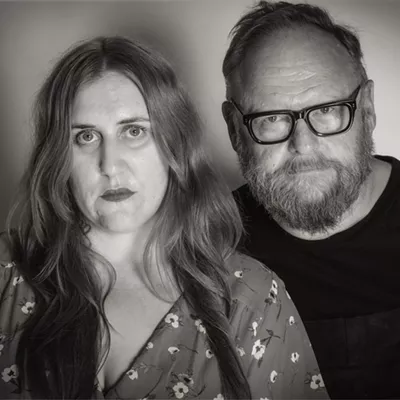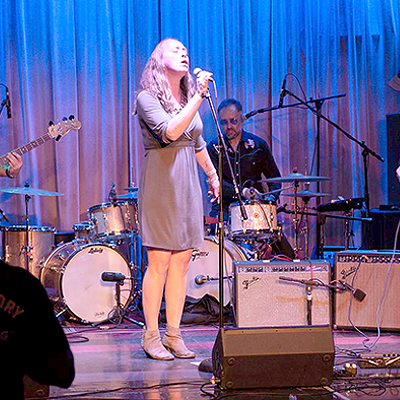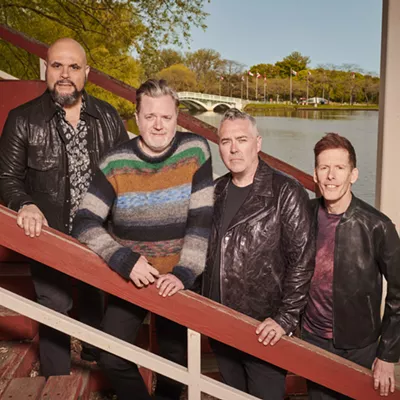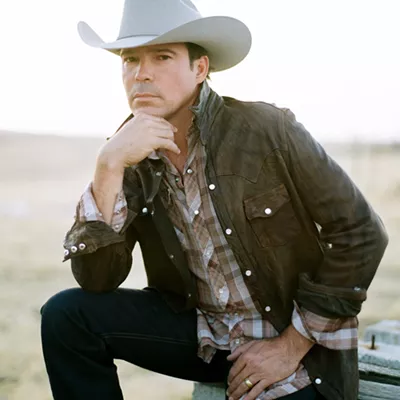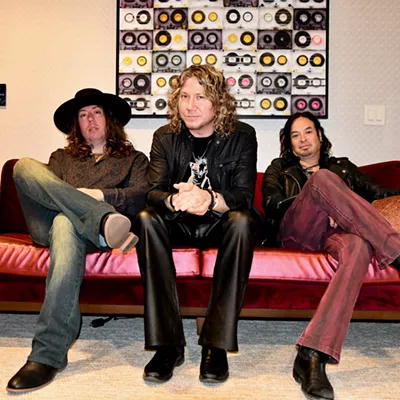"It's kind of like another song," said Oldham, in that the piece is poetic and slightly abstract--which, actually, isn't really like most of Oldham's songs, which are more focused and direct with their figurative language and ideas.
Over the past 10 years, Oldham has recorded numerous records under the names the Palace Brothers, Palace, Will Oldham and Bonnie "Prince" Billy. Each name carries with it different connotations, but the music, for the most part, is singer/songwriter Oldham singing dark folk songs, relying heavily on clean acoustic guitars.
Master and Everyone is Bonnie "Prince" Billy's most recent release on Chicago's Drag City.
"I feel like it's a little bit more streamlined, more focused than the Palace records," said Oldham. "There's no avoiding knowing a little more what we're doing after doing it so long."
Bonnie "Prince" Billy has been the name on the record spine for the last four albums. "It's mainly just a name to make records under," said Oldham.
The name does carry some semantic baggage with it; one thinks of the Elizabethan meaning of "bonny," as in, fair or fine, and the "prince" in quotations mocks nobility. Throw in after that the "Billy" and the name is simultaneously exalting, sarcastic and diminutive. Behind this name are songs taking up permanent residence directly on the gothic folk timeline.
Master and Everyone deals over and over again with the idea of feeling one way and another entirely different way at the same time. "I'm now free, the master and everyone," sings Oldham on the title track, "Servant to all and servant to none."
"That song was a song that I felt like I could stand behind as an audience member as well, because the lyrics are sort of found lyrics, from an old Italian folk song," said Oldham, explaining the decision to name the record after "Master and Everyone."
"And that's the only song where it's like that, so when I sing that song I can be like, ah, these lyrics are awesome," he continued. "And then also, this song has a relationship to every other song on the record, definitely."
"Master and Everyone" is an assertion of independence, but in the newfound freedom lies a certain sadness in the music: "You tell me there are other fish in the sea, and another gathers roses for me, on this we will agree," sings Oldham in a distant, quiet voice. It is at once celebratory and mourning, with one foot in the future and one in the past.
On the periphery of "Master and Everyone" are "Wolf Among Wolves," where Oldham sings, "Why can't I be loved as what I am? A wolf among wolves and not as a man," and "Ain't You Wealthy, Ain't You Wise," where Oldham asks, "ain't you made to give to me? Ain't it all good enough to sing mmmhmm mmmhmmmhmmm?"
"I do it for a living," said Oldham about writing songs. "Sometimes people equate the phrase 'doing something for a living' with just economics, but taken literally it means, you do it for a living, you get paid for it, but it's also you do it to live. Money is a symbol of food and shelter, and the ability to exist, which is legitimate. I don't think that money is evil, no more than killing a buffalo; it's like breath, you need it."
The songs, then, have a crafted, professional air to them. They're very Southern (Oldham lives in Louisville, Ky.), exposing the Appalachian roots of country (how else can one explain that "killing a buffalo" comment?) through the minimalist arrangements. The instrumentation is sparse, with just a few extra flourishes added to a couple songs, for example, cello on "The Way." Marty Slayton sings backup on most songs.
On previous records, such as 1999's I See A Darkness and 2001's Ease Down the Road, Oldham has worked with fellow Kentuckian David Pajo (Slint, Tortoise, Zwan) and producer Rian Murphy (who has also produced Edith Frost). 2000's Get On Jolly, recorded under the name Will Oldham, was recorded with Dirty Three's Mick Turner, and 1997's Joya features a collaboration with Dave Berman of the Silver Jews (and we haven't even mentioned the Palace Brothers). Master and Everyone is mostly Will and Paul Oldham.
A big difference between this record and other Will Oldham releases is the quality of sound: After all these records and collaborations, he's learned a lot. "It's just a little less fractured, less fragmented," Oldham said. "When we get to the recording studio, the songs have more shape and form than they did seven or eight years ago. I know more what knobs to turn and how they function. It's just easier to make the records sonically and thematically solid."
"I'm going to find something true," sings Oldham in "Maundering"; the truth, however, on Master and Everyone is in the gray area. "And even if love were not what I wanted, love would make love the thing most desired," from "Lessons from What's Poor," is just another example of the tensions present in these songs. Oldham has in the past recorded versions of D.H. Lawrence poems and written songs based on late 19th-century Indian poetry; the wealth of lyric ingenuity is obvious.
"I've got my problems, sometimes love don't solve them, and I end each day in a song," sings Oldham in "A Hard Life"; this is the mark of a true folk song: truth through music and lyric.

